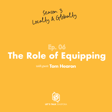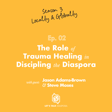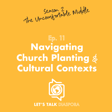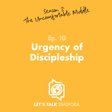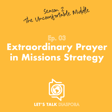Introduction to Season Two: The Uncomfortable Middle
00:00:05
Speaker
Well, welcome, welcome, welcome. This is let's talk diaspora and we're on season two, the uncomfortable middle and talking about scattering seed relationships and social justice.
00:00:24
Speaker
Yeah, thanks for that, Rebecca.
Balancing Felt Needs and Ministry of Proclamation
00:00:27
Speaker
We've been talking about in season two this uncomfortable middle where we're trying to stand in the tension of these two ditches that people sometimes find themselves in. And really the topic, I don't know if the title will end up being that. We don't know what we'll call it. We'll figure it out once we're done recording. But the topic that we're trying to address is how do we hold this balance of proclaiming the kingdom and also serving and loving the poor
00:00:52
Speaker
You could say it, healing the sick, casting out demons, but this tension between felt needs ministry and the ministry of proclamation. And what I've just observed over time is there are very few people who balance this well. Typically, you see people who are in one extreme or the other.
00:01:13
Speaker
But I hope from our conversation we can see the path forward, the faithful path is in this uncomfortable middle where we're trying to balance
Introducing Grant and the Diverse Needs of the Diaspora
00:01:23
Speaker
this. So I don't necessarily feel like the most equipped to talk about this because I honestly lean more in one direction than the other. So I always need help in this. So I have invited a dear brother to join us in this conversation.
00:01:38
Speaker
Uh, Grant is a co-labor in the city that I am in and has been just a faithful witness among, uh, Arab Muslims for about a decade. And so he has seen the gamut of people coming into our city as refugees, as asylees with lots of felt needs, but he's been a faithful, uh, Proclaimer of the gospel as well. So welcome grant.
00:02:03
Speaker
Thank you so much. It's an honor to be with you guys and I'm just really blessed by this podcast and the previous episodes and what a pleasure it is to get to sit down with y'all and I hope I can have something. Lord, give me something that we can add to this conversation because it's an important one.
Finding Constant Principles in Ministry through Jesus
00:02:22
Speaker
Yeah, but that's the idea of this is an important conversation and
00:02:28
Speaker
I had a Nepali brother tell me this a couple weeks ago and perhaps this can help us in the conversation is he said the strategy is in the harvest field. And so we have to recognize that the diaspora in North America or the diaspora in general is diverse and there are segments of the diaspora that don't have any felt needs.
00:02:50
Speaker
You think of Pakistani doctors or Hindi speaking Indian engineers or computer science majors. They don't have felt needs.
00:03:02
Speaker
But how do we continue to have a principle that goes all the way through, irregardless of what the harvest field is? And Rebecca, I think we're a good place for us to start is the scripture and say, first, does Jesus given us an example or a model to follow? And then the apostles who came after him, who's trying to emulate him, what can we learn from the scripture? So Rebecca, starting with Jesus, whenever we think of Jesus balancing this, what scriptures come to mind?
Jesus' Approach: Balancing Immediate and Spiritual Needs
00:03:33
Speaker
Well, I mean, I first think the first story that comes to mind for me, and maybe it goes with this, but it may not, is really the relationship that Jesus had with Mary and Martha, and then Lazarus passes away, and they're wanting him to come and heal right then.
00:03:51
Speaker
you know, to take care of everything right then, which was in a great felt need. But it's not something that he dropped everything and ran too. So that just is the first example that comes to my head. But then, I mean, Jesus, of course, is the great example of that perfect middle of doing both, both and, and he was, you know, always taking care of the needs, but he's also always
00:04:19
Speaker
stepping aside and going to his quiet place and spending time with the Lord even. So there's that piece as well, as well as the evangelism, as well as taking care of the felt needs.
Reflection on John 17: Compassion and Kingdom Mission
00:04:34
Speaker
So I think it's all in scripture. Yes. Grant, what scripture have you been thinking over and knowing we're going to have this conversation? Yeah, obviously.
00:04:48
Speaker
Thank you, Rebecca, for sharing that. We see in the life of Christ a compassionate heart. We see a heart that longs to help people in their felt needs, but certainly he has the kingdom in mind and all of these things. And one of the scriptures actually that I've been meditating on in preparation for this is John 17. So in that prayer with the Father,
00:05:16
Speaker
I just want to highlight, start in verse 14, that he says, I have given them your word and the world has hated them because they are not of the world, just as I am not of the world. I do not ask that you take them out of the world, but that you keep them from the evil one. They are not of the world, just as I'm not of the world. And then he goes on to say, sanctify them in the truth. Your word is truth.
00:05:42
Speaker
And as you sent me into the world, so I've sent them into the world. And for that sake, I consecrate myself that they may also be sanctified in truth. And then here, I do not ask for these only, but also for those who will believe in me through their word. And so clearly we see as he is preparing to go to the cross, his heart is that those of us who are the elect
Preaching, Healing, and the Importance of Teamwork
00:06:11
Speaker
He's praying for us. He's interceding for us. He has given us his word, and he understands that because we have his word and we will share that word, we are going to bring upon ourselves hatred and rejection. And then he's saying, and I also pray for those who will hear this word in the future from my sheep. And I pray for them too, that they will be kept. And so I just think that Jesus clearly has in mind that
00:06:41
Speaker
He gave us a mission, and it's not only in the passages of the Great Commission in Matthew 28, but we see it all throughout Jesus' ministry, that he had such a heart for people, but clearly he has this mission of advancing and proclaiming the kingdom is near, and he has given us that mission, even in that beautiful prayer in John 17. That's really good. I think
00:07:09
Speaker
There's a couple places that I've thought about with Jesus's ministry. And Mark 1, I love the gospel of Mark, because Mark writing this account just gets right to the point. And it's so action-oriented. It's still in chapter 1. Jesus, he says, in response to basically a crowd coming with the healing of Peter's mother-in-law, he says, I have to go to nearby villages so I can preach there also.
00:07:37
Speaker
And it says, that is why I have come. Even though he just did a healing, so it's like it's this balance and tension. He just healed someone, which created this crowd, which we would say, oh, look, we have this crowd. Like, that's basically what the disciples are saying. Look, Jesus, what you've done, you've gotten this. And he says, no, no, no. We have other places to go. We're gonna go to these nearby villages, so I can preach there also. This is why I have come.
00:08:07
Speaker
And so when we think about that, I love the Luke acts narrative and acts one one Luke writing, you know, it says, uh, dear Theophilus and my first account, I wrote to you about the word and works of Jesus.
Roles in Ministry: Apostle, Prophet, Evangelist
00:08:24
Speaker
And so we, we see that, that there is this, this unison of the word and the works. But also when I think of Jesus's ministry, uh, he, he was a homeless,
00:08:36
Speaker
Traveling rabbi and the way we think of meeting needs wasn't the way that he met needs He was dependent on other people Women first in the first century to be dependent on women was actually like so weird But he was so dependent on other people. Yes. He fed the 5,000. Yes. He fed the 4,000
00:09:00
Speaker
But that was that was a miraculous event. He turned water to wine. That was a miraculous event. And so we have people who lean into that and say, this is what Jesus is all about. I don't know that's what he's all about. But it was this compassionate heart. And then, too, when you think of sending out
00:09:21
Speaker
You know, in Luke five through seven, Jesus is modeling ministries, casting out demons, healing the sick, proclaiming the kingdom. His disciples are just watching. Luke chapter eight, we have some teaching of parables. Luke chapter nine, he sends out the 12. And if you remember sending out the 12, he says, don't take stuff that you could be a blessing to people with. Be needy is what he's saying. And what are you doing? Casting out demons, healing the sick, proclaiming the kingdom. The 12 come back.
00:09:51
Speaker
Give a report. Now there's 72 others. He sends out the 10 with very similar instructions. Don't take this. Heal the sick. Proclaim the kingdom.
Collaboration in Ministry: Avoiding One-Size-Fits-All
00:10:01
Speaker
So maybe a question I have with Jesus's ministry is we clearly see this, but how does his approach to meeting needs apply to our context?
00:10:16
Speaker
Meaning many of us are not necessarily depending on a supernatural intervention to meet the needs of the people that we're ministering to. We're depending on this food bank or this source of revenue to buy these supplies for these people. Does that make sense what I'm asking?
00:10:38
Speaker
What I hear you saying is, well, the first thing I hear as we talk about scripture is the importance of that relationship again and the Holy Spirit guiding you to what's next and who's next, but also guiding you to where those resources and those things are going to come from.
00:10:56
Speaker
which is a beautiful picture of the church, you know, and God saying, we need to come together and it takes all of us to meet the needs instead of one of us coming in and say, here, I've got all the answers and all the needs met. Yes. Yes. And I just have been so blessed by my partnership with you, bud, because I just feel like this is something you champion a lot as the way we team together.
Embracing Diverse Roles and Teaming in Ministry
00:11:22
Speaker
and recognizing, and you even sat in my home a couple years ago and taught me through the teaming circles, the concentric circles, but just thinking about how we all do play a role in this. And I used to get so frustrated because I wanted everyone to be completely focused and completely doing the same thing that I was doing and other workers even, especially if they are organizations or ministries,
00:11:50
Speaker
that are saying, hey, we want to see disciples among these ethnic people groups here in the city. You know, I used to get very frustrated that I felt like I had a way that I wanted to do it and I thought we needed to do it. And others seemed to be more focused on spreading that net very wide. And I was screaming, no, we got to be focused. We got to get down to the individual level, one on one.
00:12:18
Speaker
And some of those organizations wanted to, it seemed to me at the time to be known by as many of the refugees that they could and cast that net real wide. But I had a brother sit down with me once, and he's from my church, and he was a missionary overseas. And he just began to help me see that we do have different roles in this, and that individual that could
00:12:44
Speaker
he had a gift that that one individual for go casting that net wide. It allowed for others to come in and partner who'd had a different approach maybe and how to work together. And so there's a lot of conversation about teaming that that needs to happen. I think on this because we tend to think about evangelism or think about social gospel. Like you said,
00:13:08
Speaker
as extremes or that they don't relate to one another. But I think that if we have this conversation like we're doing now, we can tend to find this healthy balance you're talking about.
00:13:22
Speaker
That's a good point. Teaming and collaboration I think is huge, especially if you're in a city or in a geographic area, knowing others who are committed to a type of work among a focus people group or a segment and learning how to work together. And whenever you were talking about different roles or functions, I think
00:13:50
Speaker
In Ephesians 4, Paul is writing about the apostle, prophet, evangelist, shepherd, teacher, that those functions are gifts to the church to equip the body of Christ so that they may reach full unity and the fullness and the maturity in Christ. And I don't see a lot of that in the church today. I don't see a lot of those roles working together.
Pleasing God Over People: Apostle Paul's Evangelistic Intent
00:14:19
Speaker
in kind of our cross-cultural worker segments in cities. They have their thing. We have our thing. But I think the point is, is you have to work together. And Jesus, we'll move on from Jesus, but just thinking about Jesus, he was meeting needs, but his needs were being met.
00:14:45
Speaker
It was reciprocal, and I think that's how our ministry partnerships have to be, is reciprocal. So that if my ministry is primarily focused on evangelism, disciple making, and church planting, I am going to know people who have needs.
00:15:04
Speaker
And it's kind of like if we think of Acts 6 and the establishment of the deacons, if you read that passage that way, it was someone who's saying, this is my focus, but I can't let this need go unmet, then that means you're equipping and mobilizing others to meet the need. And I would say on the opposite side of someone is,
00:15:28
Speaker
very much in refugee resettlement, not a proclamation ministry, food distribution, and they're a born again believer, the Lord has to be tugging on them that these people's eternity matters. And then those who are on the opposite side can come and say, well, let me serve you in this way, whether it being visiting with people that they have contacts with or helping them with resources, giving them Bibles, giving them some training.
00:15:56
Speaker
And so I think maybe what we're saying so far is what we've seen is to be in the middle, you have to collaborate. That's true. What about the apostles teaching? Anything from the apostles that gives us maybe some additional insight and then we want to get to maybe some stories and some practical things. We're talking about the tension between, like you said, social justice
00:16:25
Speaker
Uh, and the evangelism you, you clearly, what I mean, just in practice. And this is something that I would imagine has always been in the church. There's such a need. There's always needs around you. And if you have identified yourself as someone who longs to meet that need in the name of Jesus, those felt needs, there will always be that need. Jesus said, you will always have the poor with you.
00:16:51
Speaker
In the context of that scripture, he's saying, in this way, seek, put me first, worship is first, you know, but you're always going to have that and you're always going to be asked. And I just think about something, you know, we think about the apostle Paul and what a strong evangelist he was and how he was compelled to preach the gospel. And so the scripture that comes to mind, this is something in my ministry, it's really helped me for years.
00:17:21
Speaker
Kind of was one of the first verses that I said I really feel this connection in this tension It's first Thessalonians
Balancing Evangelism and Social Work with Clarity
00:17:28
Speaker
2 so Paul beginning in verse 4 Let me pull that up here He says just as we have been approved by God to be entrusted with the gospel So we speak not to please man, but to please God who test our hearts so there you have that just stop there and just say it's really important we talk about that because
00:17:50
Speaker
Evangelism is denying ourselves. It's denying how people receive us. It's denying how all of the temptations in our own head to the fear and the concern for rejection, or we're not taking into account, are we being genuine? Are they ready to receive this? He just says, I'm not here to please men. I'm here to please God.
00:18:18
Speaker
He said, we never came with words of flattery, as you know, nor with the pretext for greed, nor do we seek glory from people. And once again, I think that we do see here a lot of times, and this is, I'll just, I'm going to speak for myself. Okay. We began, God called us to this ministry from living within an apartment complex around refugees over a decade ago. So there was always need.
00:18:49
Speaker
and we were being asked to meet that need. And my heart was burdened for their felt needs, which were so many. And so wanting to help, we're doing that in good heart and we're trying to get the church involved and we're trying to meet all those needs. What can happen? I'll just speak for myself. What can happen is, like you said in the intro, I began to see that there is opportunity for more
00:19:17
Speaker
momentum behind what is tangible, what is visible. And so the church was excited to rush to things that they could fix and step in. When it became one-on-one, just we've got to be more concerned about the gospel, the crowds went away, the help went away, some of our funding got cut because
00:19:45
Speaker
We felt like we had reached the level of a platform and now we needed to maximize that moment. We had already had the entry into their homes using all of that help, but now it was the time to start using the gospel. Now was the time to start getting the Bible open and them having it in their hands. And so he says later in that scripture, it's not that he's not concerned with people.
00:20:15
Speaker
I believe it's verse seven of verse, I think it's verse eight, uh, that he says that I, it tells the Thessalonians that I did not only impart to you the gospel, but my very life. I entrusted my life to you. And I've felt this early on too, from one of my mentors who told, you know, shared this with me.
Prioritizing Love for Christ in Service to Others
00:20:34
Speaker
We were being incarnational, like Christ, leaving glory and stepping in. I felt like we were stepping in and being real with these people.
00:20:43
Speaker
But so many times early on, I felt like their thoughts of me or how much they liked me or the fear that that relationship could end, it kept me quiet at times. It kept me strategizing and saying, well, maybe later, maybe we will work our way up to that.
00:21:11
Speaker
And the Lord really convicted me of that about five years ago and really put it on my heart that we have to be very clear about what we're doing, no bait and switching. And we need to go out together with a heart that's very intent on obeying Him and loving Him rather than loving those first and foremost that we're going to reach. We have to love Christ first, obey Him first.
00:21:36
Speaker
I think that's what he's even saying when he talks about we'll always have poor among us. I mean, that's when Mary, I think, was washing his feet. And, you know, the disciples are all upset because Jesus is letting her use this expensive perfume to wash his feet. And he's reminding them, you're only going to have me here on earth for very little time. And when it takes us back to the focuses upon him,
00:22:06
Speaker
and not on anything or anyone else. I think maybe a topic of conversation for another podcast episode, I just want to kind of breach a little bit. It came up last season with our interview with Paul whenever he was talking about, if you remember Paul was our brother from Afghanistan and he was talking about how Afghans are hard workers, but if you give them stuff, they will become lazy.
00:22:33
Speaker
And so the topic also has to play into this of like when helping hurts, like that we promoted that book during that podcast. And so you also have to understand that there are people who are doing things in the name of Jesus by meeting felt needs as they're actually enabling bad behavior, not only not proclaiming the gospel, but they're actually not giving people dignity.
Maintaining Dignity and Avoiding Enabling Behaviors
00:22:57
Speaker
That's the thing I see with Jesus's ministry,
00:23:01
Speaker
to meeting needs. He gives them dignity. I think of the woman at the well. He brought nothing to her. He asked from her. And so whenever he's sending out the 72 and the 12, he's sending them without provision so that there can be this dignity of I'm bringing the gospel to you in word and deed, but I'm needy and you have something to offer me.
00:23:31
Speaker
And so I think it's important to understand that that is a part of this conversation as well as there's unhealth potentially in it as well. I would say another helpful resource on that. We're on the same
Cross-Cultural Servanthood: Listening and Learning
00:23:44
Speaker
page. I was thinking of that resource and I was also thinking of an author by the name of Dwayne Elmer wrote a book on cross-cultural conflict. He followed that up with cross-cultural servanthood, but he proposes
00:24:00
Speaker
what he calls the one down approach. So it's exactly what you're saying. And I just speaking from experience is so honoring to these people. When we began to come like that as a, as a person that will receive from them, that will take from them. That's what I think, uh, I hear even when Paul says, I entrusted my life to you.
00:24:28
Speaker
Like, we're doing life together, it's relational, and we don't compromise the gospel. It's not that we are somehow saying, I'm an open book, you know, you teach me any doctrine you want to or whatever, but we can even, and even in that, just the respect you can show when you listen to people, it doesn't mean you're ascribing to their belief system, but you listen to them, you allow them to speak into things,
00:24:56
Speaker
Uh, we, we do feel like we, we, we clearly have the answer. Uh, but we feel like we have to feel the pressure of having all the answers sometimes. And so what, what it does with people, when we receive from them, we don't rush in to fix their problems. God begins to show us other ways, other avenues that we can speak into their life that we maybe didn't realize that we had missed. Like you're saying, bud.
00:25:24
Speaker
Because if we know going in, this is what they need. I already know. I'm going to go in and we're going to tackle this problem. We're missing all of those things that are happening that we don't know that they need. And many times those are emotional things and those are the great spiritual needs.
Risks of Unintended Consequences in Ministry
00:25:44
Speaker
I don't remember what book I was reading, but it's talking about this topic and it talks about the unintended consequences.
00:25:52
Speaker
And I think whenever we rush in and we feel like we know the answer before we've done the research, really heard from people that there ends up being unintended consequences. And there was, there was a, I don't remember what the example was. This was not in the diaspora setting, but it was someone who was going to go in and start planting food for these people because they didn't have food. Um, and what ended up happening is there were more people to starve because of what he did than people who like
00:26:22
Speaker
were delivered from the issue he was trying to address. And I don't remember all the details, but I think that is applicable in a micro sense in the diaspora where we have unintended consequences to our actions that are well-meaning, but maybe ill-informed.
00:26:42
Speaker
And I think too, as you're both say, I'm hearing both of you say this as well, that there's a little buy-in on both sides, you know, the one that is going in to share or serve as well as the one that is you're
Gospel Imperative and Collaborative Approaches
00:26:57
Speaker
serving. So you want both to be able to give a little and to be a part of the solutions and the finding the answers and not one person giving the incomplete answer. Yes.
00:27:12
Speaker
So we've talked a lot about the aspect of meeting felt needs, but I think we, I feel like I need to double down and say, um, there is a gospel imperative in the great commission that you have the great commandment. Love the Lord, your God with all your heart, mind, soul and strength. You have the great commission, which is not just Matthew 28. There's multiple places in the scriptures where you see that we are called to proclaim
00:27:41
Speaker
and make disciples of all nations, you can't do that without an evangelistic witness. You cannot be faithful to a missionary call without being a witness. And so even for our brothers and sisters who may be more prophetic in their gifting, and what I mean by that is they are about calling out injustice and finding ways to meet those needs. I need to challenge you
00:28:09
Speaker
to also share the gospel, not just in deed, but also in word. And you, brother or sister, I need you to challenge me and say, brother, you are proclaiming the kingdom, but are you healing the sick? Are you meeting felt needs when it's applicable? And I think that comes back to this. We have to be in relationship with other workers who are totally different than us. It's not that we have to be best friends. We hang out three times a week.
00:28:38
Speaker
But I have to know you. You have to know me. And we have to have an open line of communication because oftentimes we are touching the exact same people in our harvest field and we're going at it from different directions. And what I've seen happen is one will actually talk negatively about the other.
Funding Challenges and Showing Results in Ministry
00:28:59
Speaker
And then how unattractive is that a representation of the body of Christ? We have to come together and say, this is what it means to be the church of Jesus Christ in our city, ministering to your needs. So we're coming up to the end of this. There's one other thing I want
00:29:21
Speaker
to say that I think is really helpful. And then I'm going to let Rebecca and Grant, you kind of close this out. Grant, I would love for you to retouch on this idea of funding and that as well. But I have heard it said, and I think I heard this from David Garrison, that ministry is answering the prayers of lost people.
00:29:46
Speaker
And so I, but then evangelism is sharing the good news of the kingdom in a way that they hear, can understand and accept it and pass it on. And so understanding there's a difference between ministry and evangelism, because lost people are not praying that you will come share the gospel with them. But lost people may be praying that for a felt need. So understanding that there is a difference
00:30:16
Speaker
between ministry and evangelism, but just because there's a difference doesn't mean there has to be a separation. Just thinking about our partners, thinking about people, we've had these conversations a lot. And I recognize that, as you said, I do think that oftentimes it seems to me that funding does play a part. There is so much pressure.
00:30:42
Speaker
on these cross-cultural workers, especially those who do not carry full-time jobs somewhere else. There is so much pressure to how to show your work. I think there is pressure. It feels at times, even from our churches, about return on investment, whether they mean that or not. And I'm not speaking for all, but I'm just saying this is
00:31:13
Speaker
in hearing from these individuals, everybody wants to have the idea. They want to get it. I think this is one reason why it's been a hard thing for us, but as we've been trying to really share and encourage and bring some teaming together across organizational lines, because they do have to put those newsletters out. They're something tangible. And even in fundraising,
00:31:41
Speaker
if we can tie in things that they can, you can give so that we can buy this or that. And so it's such a, it is such a challenge. I just think that where we are right now with, you know, in here in our context, we're encouraging these, this funding, this, this teaming together. I just think that there are individuals who really need to hear and be encouraged that,
00:32:07
Speaker
We are supporting each other. We're going to stand with one another. We're praying together. I personally, I feel and have started to advocate for other workers in their funding so that we don't feel the pressure of having to perform, feel the pressure to have to show this.
00:32:24
Speaker
Well, I was just going to, I think what I'm hearing is it's again, the both and not one or the other.
Balancing Social Justice and Evangelism
00:32:33
Speaker
And the importance of having both is where we're going to find that happy medium in the middle of keeping our eyes on Christ, working together, serving together, seeing that we all bring in different gifts and pieces to the big
00:32:49
Speaker
pie, if you want to say, the big picture, the big puzzle, and just the importance of that. So I just pray that each of us can find where our peace is in that and continue to work better together for the kingdom and for many more to know him and trust him and have their needs met as well. And I just want to say that
00:33:16
Speaker
You know, standing with those who are meeting needs is very important. Like the needs are continuing because we continue to receive people here in our context who have nothing. And so, like you said, it is a both and, and we want to celebrate both. We want to involve ourselves in
Supporting Ministries and Sharing the Gospel
00:33:37
Speaker
both. And we're just waving this flag to say, as we do that,
00:33:43
Speaker
We don't want to hear more stories like the one I heard not that long ago from a brother who said, I'm really encouraged by what you guys are saying. I should share with my Afghan friends. I got a ton of Afghan friends and I've known them this group of four Afghans for about, uh, two years. And I think it's time I tell them I'm a Christian. I think it's time I share that and that it's grievous. It's grievous. And so.
00:34:10
Speaker
We have to get back to the call of God on our life. Our call is not just to find ways to promote ourselves to help. These people are dying. These souls are very important. But once again, we wrestle with how the method is still open. We can still have different methods. But I remember one time you walked into a market with me and you walked right up to that guy and I cringe.
00:34:40
Speaker
Because I'm like, Oh, but my method is to do it a different way. But why would I cringe? Like, why would I say I feel uncomfortable with going right up to that guy? There was an urgency in you. And so we, like you, you mentioned that sometimes we can be negative about each other. And so one of the things that our organization Alliance 436 does is we just really try to live out and communicate within this network that we have favor a Romans 12.
00:35:09
Speaker
that let our love be genuine for one another in the body of Christ and look for ways to rejoice with those who rejoice, weep with those who weep. We're just championing this, that we want to join you and hope that the Lord would answer our prayer that they would reciprocate. And so, Bud, I think you're on the right track and we can continue to lead people into these trainings and prepare them, not just to sparkle Jesus, not just to shine
00:35:38
Speaker
from deeds, but that we would be faithful in proclaiming the word, because over and over again, we are told not to stay silent in the scriptures by our Lord. So we have to open our mouths. Faith comes by hearing.
00:35:54
Speaker
Thanks for that grant. What I wanna do is in the show notes, we will put contact information for grant. In our city, we do have great coalitions and networks like the Alliance 436, who's really about supporting workers and advocating for collaboration. And so if your city doesn't have something like that, I don't know that we're a model to follow, but we're trying to walk this forward in faithfulness to Christ and the witness to the lost world among the diaspora.
Encouraging Collaboration and Sharing Insights
00:36:23
Speaker
We're failing forward, but if we could better serve you in your city by you just seeing our mistakes and what we're getting right, we would love to share that with you. The conversation went a little different than what I thought it would, but I'm so glad it did. I think it was edifying for me, and my prayer is that
00:36:43
Speaker
As a listener, you are hearing the need for collaboration in connecting with people and proclaiming the kingdom. Because if you remember back to our introduction, that was the two categories, and we're really trying to bridge those two categories. So thanks, Grant. Thanks, Rebecca. Thank you for listening. Let's talk diaspora.
00:37:03
Speaker
Haradi Jews are some of the most unreached people in the world. But God is moving in this community and we sense that the time is ripe to increase our efforts to reach them with the good news. The key to this outreach is prayer. We invite you to journey with us into the world of the Haradium.
Conclusion: Call to Prayerful Outreach
00:37:19
Speaker
and to meet Haradi men and women as well as the believers who serve them and to join us in the critical work of prayerful intercession. Start learning and praying with us today with a free digital download or you can request a free copy at upgnorthamerica.com forward slash resources.




